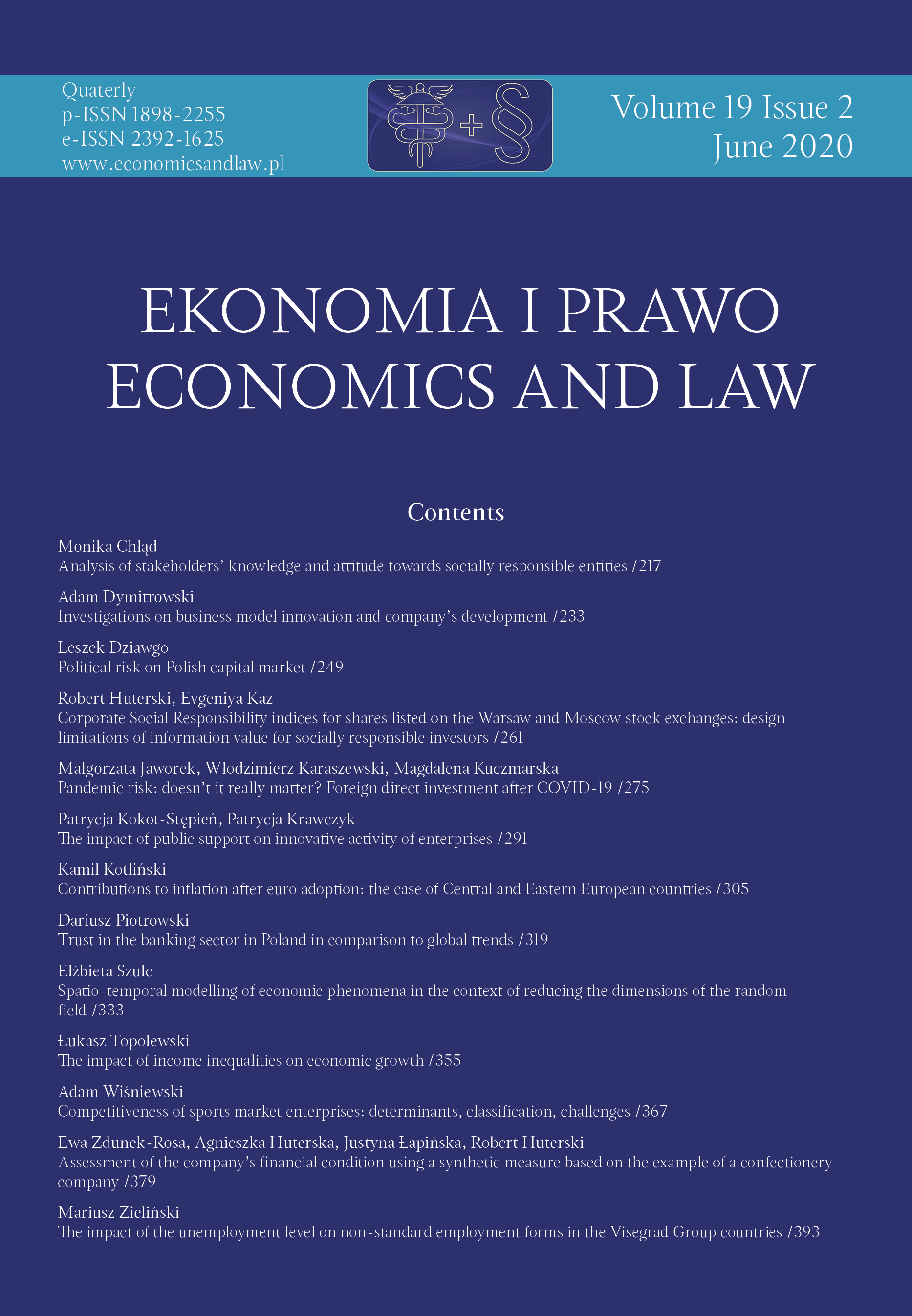The impact of the unemployment level on non-standard employment forms in the Visegrad Group countries
DOI:
https://doi.org/10.12775/EiP.2020.027Keywords
unemployment rate, non-standard employment, Visegrad Group countriesAbstract
Motivation: The scale of presence of non-standard forms of employment in the different economies depends on the laws in force, the offer on the demand side (employers), and the interest in that offer on the supply side (employees). Non-standard employment is more beneficial to employers than to employees because it often involves worse working conditions and lower wages. The evaluation of the relationship between the level of unemployment and the share of non-standard employment forms in Visegrad Group countries includes a comparison of the changes in the unemployment level and the share of non-standard employment forms in employment in the 15–64 age group. In order to verify the hypothesis, the coefficients of correlation and determination between the unemployment rate and the employment in non-standard forms were calculated.
Aim: The purpose of the article is to study the relationship between the unemployment rate and the share of non-standard forms in employment in a selected group of countries in the long term. The hypothesis is that changes in the unemployment level are related to changes in the share of non-standard forms in employment.
Results: The hypothesis of the article was not confirmed in most of the analyzed cross-sections. Although a statistically significant relationship was observed between the unemployment rate and part-time employment, in a half of the studied countries the relationship was positive and in the other half — negative. The only exception was Poland, due to the very high correlation between the unemployment rate and all the analyzed non-standard employment forms, which was confirmed by high determination coefficient.
References
Amuedo-Dorantes, C., & Serrano-Padial, R. (2010). Labor market flexibility and poverty dynamics. Labour Economics, 17(4). doi:10.1016/j.labeco.2010.01.004.
Babos, P. (2014). Step or trap? Transition from fixed-term contracts in Central Eastern Europe. Post-Communist Economies, 26(1). doi:10.1080/14631377.2014.874230.
Bertrand-Cloodt, D., Cörvers, F., Kriechel, B., & van Thor J. (2012). Why do recent graduates enter into flexible jobs? De Economist, 160(2). doi:10.1007/s10645-011-9185-2.
Bloisi, W. (2007). An introduction to human resource management. London: McGraw Hill.
Blundell, R., Crawford, C., & Jin, W. (2014). What can wages and employment tell us about the UK’s productivity puzzle? The Economic Journal, 124(576). doi:10.1111/ecoj.12138.
Bryson, A., Cappellari, L., & Lucifora, C. (2005). Job satisfaction and employer behavior. In S. Bazen, C. Lucifora, & W. Salverda (Eds.), Job quality and employer behavior. London: Palgrave Macmillan.
Debels, A. (2005). The structuring of labour market dynamic along the permanent-temporary distinction: a comparision of Denmark, France, Spain and United Kingdom. Paper presented at the Conference of the European Panel Users Network. 30 June–2 July 2005, Colchaster. Retrieved 10.01.2019 from http://www.iser.essex.ac.uk.
Eamets, R., & Jaakson, K. (2014). Labour market flexibility and spatial mobility. International Journal of Manpower, 35(6). doi:10.1108/ijm-05-2014-0123.
Eurostat. (2019). Retrieved 10.01.2019 from https://ec.europa.eu.
Fouarge, D., de Grip, A., Smits, W., & de Vries, R. (2012). Flexible contracts and human capital investments. De Economist, 160(2). doi:10.1007/s10645-011-9179-0.
Gaston, N., & Kishi, T. (2007). Part-time workers doing full-time work in Japan. Journal of the Japanese and International Economies, 21(4). doi:10.1016/j.jjie.2006.04.001.
Gonzalez, X., & Miles-Touya, D. (2012). Labor market rigidities and economic efficiency: evidence from Spain. Labour Economics, 19(6). doi:10.1016/j.labeco.2012.08.006.
Hauseman, S.N. (2001). Why employers use flexible staffing arrangements: evidence from an establishment survey. Industrial and Labor Relations Review, 55(1). doi:10.1177/001979390105500109.
Industrial Relations Services. (2001). Part-time workers: in from the periphery. IRS Employment Trends, 725.
Kalleberg, A.L., Reynolds, J., & Marsden, P.V., (2003). Externalizing employment: flexible staffing arrangements in US organizations. Social Science Research, 32(4). doi:10.1016/s0049-089x(03)00013-9.
Kehoe, J., & Dickter, D. (2006). Customer service quality selecting value performers. In L. Fogli (Ed.), Customer service delivery. San Francisco: Jossey-Bass.
Need, A., Steijn, B., & Gesthuizen, M. (2005). Long-term effects of flexible work. In B. Peper, A. von Doorne-Huiskes, & L. den Dulk (Eds.), Flexible working and organizational change: the integration of work and personal life. Cheltenham: Edward Elgar.
Noe, R., Hallenbeck, J., Gerhart, B., & Wright, P. (2006), Human resource management, gaining a competitive advantage. Boston: McGraw-Hill.
Russo, G., & Hassink, W. (2008). The part-time wage gap: a career perspective. De Economist, 156(2). doi:10.1007/s10645-008-9087-0.
Silva, J.I., & Vazquez-Grenno, J. (2013). The ins and outs of unemployment in a two-tier labor market. Labour Economics, 24. doi:10.1016/j.labeco.2013.08.009.
Zieliński, M. (2018). Effect of economics situation on employment and its structure in the Central and Eastern European countries. Ekonomia i Prawo Economics and Law, 17(3). doi:10.12775/EiP.2018.024.
Downloads
Published
How to Cite
Issue
Section
Stats
Number of views and downloads: 848
Number of citations: 0
